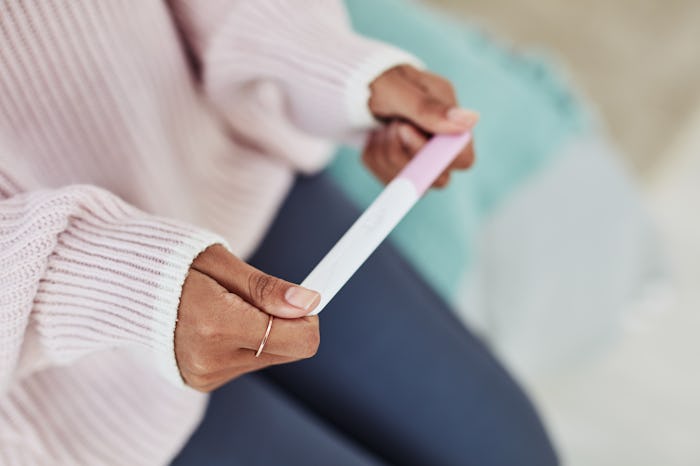Life

Here's What You Need To Know About Ovulation After A Miscarriage
Experiencing a miscarriage is devastating, and waiting for the green light to try again can be daunting and emotionally difficult, too. But science says your body may be ready sooner than you think — you just need to figure out the right time for you to start trying again. When it comes to timing, knowing if ovulation is affected by miscarriage can make trying again a little easier.
You might assume that when you have a miscarriage, your cycle and ovulation days will be thrown off, but that's probably not true. Dr. Felice Gersh, OB-GYN and the author of PCOS SOS Fertility Fast Track, tells Romper, "Ovulation is usually not impacted by a miscarriage, and women often resume ovulation and normal cycles the very next month. Women can become pregnant just two weeks following a miscarriage." However, Gersh notes that if you experienced very irregular periods before you got pregnant and had a miscarriage, then you'll likely return to that irregular cycle, which could complicate things.
When you can start trying for another pregnancy again also depends on when the miscarriage happened. Dr. Allen Morgan, reproductive endocrinologist and leading infertility specialist at Morgan Fertility and Reproductive Medicine, tells Romper, "Since more than 90% of all miscarriages occur two to four weeks after ovulation, almost all of these do not need surgical intervention such as a dilatation and curettage (also known as a D&C)." If you do not have a D&C, Morgan says, "Most gynecologists will suggest skipping one month before you start trying again." If you do have a D&C, it's something you'll want to speak to your doctor about as that can vary on an individual basis.
If a miscarriage happens early in a pregnancy, then your body may be ready to get pregnant again almost immediately. So should you start trying within a few weeks? The answer to that question really depends on both your body, your emotional wellbeing, and advice from your doctor. Gersh recommends waiting three months to allow time for grieving and to focus on your health, but she also says, "This is not a hard and fast rule." You truly have to do what's right for you. It's also worth noting that the Mayo Clinic recommends avoiding sex for two weeks after a miscarriage to prevent infection.
Waiting may be better for your mental health, too. Dr. Steven A. Rabin, a gynecologist in Burbank, California, tells Romper, "We were taught to advise waiting for three cycles to pass before trying to conceive. This old wisdom turns out to not really have a physiologic basis. The rate of subsequent pregnancy loss is not better with waiting. However, there may be an emotional benefit to waiting since the loss of a pregnancy can be devastating and a pause may benefit couples in other ways."
Emotions aside, research has actually shown that trying again fairly quickly might increase your chances of getting pregnant. A 2016 study published in Obstetrics & Gynecology found that women who try to conceive within three months of a miscarriage might have a better chance of getting pregnant and having a live birth. And researchers at the University of Aberdeen looked at a comprehensive review of studies and found that women who conceived less than six months after a miscarriage had a lower risk for another miscarriage and a lower risk for preterm birth.
Of course, you should always talk to your personal doctor about when you can try again after having a miscarriage, especially if this isn't your first miscarriage. "If this was a third miscarriage, or even a second, depending on age and other factors, a medical evaluation should be done to see if the underlying causes can be determined," explains Gersh.
And don't forget about your mental health. It's very important that you feel emotionally ready to try getting pregnant again before you actually go through with it. If you are struggling to deal with your miscarriage, there is help out there: you can call Postpartum Support International at 1-800-944-4773 or speak to a therapist.
Experts:
Dr. Felice Gersh, M.D., OB-GYN, founder/director of the Integrative Medical Group of Irvine in Irvine, CA, and the author of PCOS SOS Fertility Fast Track
Dr. Allen Morgan, MD, double board-certified OB/GYN, reproductive endocrinologist, and leading infertility specialist at Morgan Fertility and Reproductive Medicine
Dr. Steven A. Rabin, MD, FACOG, gynecologist in Burbank, California
Studies referenced:
Schliep K, Mitchell E, Mumford S, Radin R, Zarek S, Sjaarda L, Schisterman E. (2017) Trying to Conceive After an Early Pregnancy Loss: An Assessment on How Long Couples Should Wait. Obstetrics & Gynecology, https://www.ncbi.nlm.nih.gov/pmc/articles/PMC4780347/.
Kangatharan C, Labram S, Bhattacharya S. (2016) Interpregnancy interval following miscarriage and adverse pregnancy outcomes: systematic review and meta-analysis. Human Reproduction Update, https://academic.oup.com/humupd/article/23/2/221/2605931.
This article was originally published on